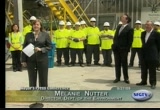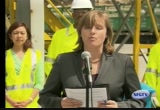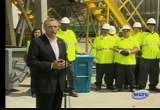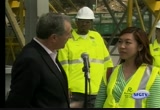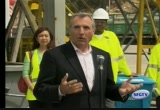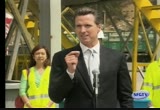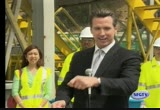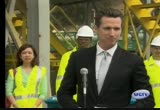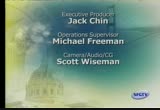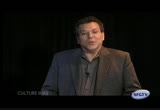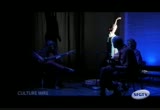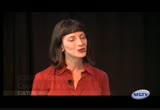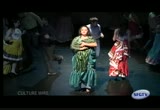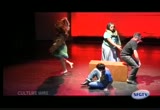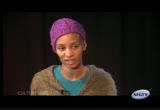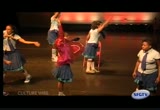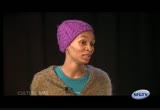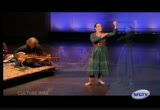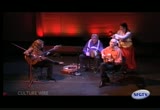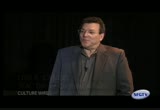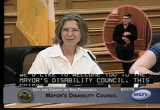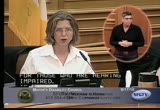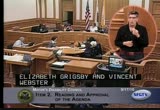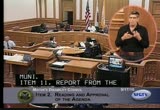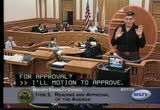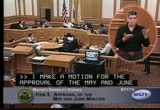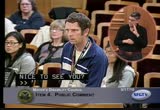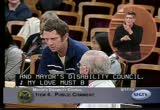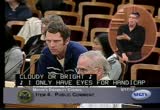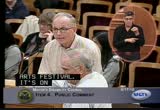tv [untitled] September 20, 2010 5:30am-6:00am PST
6:30 am
[applause] >> hang you, mayor newsom, and thank you for helping us achieve our 77% landfill that version rate -- thank you, mayor newsom. we need to focus our attention on achieving 0 waste by 2020. to meet our goal, we will need the continued participation of all san franciscans in the mandatory composting and recycling program, making sure that everything possible goes into the blue and green bins, and as little as possible goes into the black. as the mayor pointed out, we sent the smallest amount of material to landfills since we have been keeping records. less than 15% the year before. we are right on track, and if we keep up achieve 0 well in san francisco well before 2020. .9 waste in san francisco well before 2020.
6:31 am
we already accomplished this lovely to a degree with bans on hard to recycle products like plastic bagszek]ñisr and a the. there are actions globally, but change does need to happen at the state and federal level, and that is why san francisco has been supporting extended producer responsibility legislation in sacramento and washington. taxpayers and local governments shell out millions of dollars every year to handle problem products. it is time that we require that manufacturers take responsibilityrw for their own actions and their products. when we hold corporations responsible for making sure the products they sell get recycled properly and one public health and environmental costs are factored into that product price, manufacturers have a strong incentive to design goods that last longer, are easily recyclable, and ultimately are less toxic. we need to give a lot of credit
6:32 am
to our partners at recology for the city's recycling success. we do not have a garbage company. we have a recycling company. so it is my distinct pleasure to introduce recology's ceo and san francisco's no. 1 ally in zero ways. mike. [applause] -- zero ways. mike. >> thank you, and thank you, mayor newsom, for using our site for this announcement. we are pleased to be the city's partner in helping achieve the goals that the city sets forth. some of them have been rather exciting to try to accomplish, but it has been found, and we are going to ensure that this city isw6r;[ñhr the first to ace zero ways, and we are going to do it before 2020. there are a lot of exciting things going on, and we believe it is doable, and we are
6:33 am
committed to making sure it happens. in the process, it has been pleasing for us to be able to put people to work doing a very necessary function. i want to introduce mimi chan, who came to us through the jobs now program and has been able to get to work doing something that we did not have the money to do before the programf5b gave us te work -- the money to do the work. >> i love this company. when i first started, i was really excited because i was working for a green company. when i leave, just about work. i bring my work home. i teach my kids about recycling, composting, and when i go to another city, another state, it angers me to see people throw everything in the garbage. i tell them that they cannot do
6:34 am
that.u we have think i'm crazy,' but when my - year-old steps in and says if you have to recycle and compost, they know that i am serious. i love my job. kvfutu3ñiññi have kids. i have kids, and it is just securing its future for my kids, my grandkids, and everybody down the line, and i thank you for the opportunity. >>ñ%iñkó we have 3000 to 5000 s come through here every year,y home and teach their parents how to do it right. as all these families are visiting other communities, it is amazing how many other places want to achieve what we're doing here, and wegqvúr?r think we arn a position to help them accomplish that. mayor newsom: interesting anecdote. you will probably appreciate -- no, you probably will not, but i will throw it out anyway. [laughter] we've diverted about 8 million tons of waste, which is roughly twice the tonnage of the golden
6:35 am
gate bridge. we only put about -- what? 600,000 tons into the landfill, which again, to put it in perspective -- just 200,000 tons last just in the second, so see how quickly we are moving to reach our goals? it is an extraordinary thing. what is equally extraordinary is the need to continue to promote these programs. we still have roughly 2/3 of what is here that still goes to landfills. that can be recycled, so we still have all this low hanging fruit -- literally, fruit -- that can be easily composted that is still being put to a landfill because we are not separating all of it. we have seen a 45% increase in composting. without being punitive, without
6:36 am
being aggressive, just educating folks. being thoughtful, encouraging people, but again, we are still within the margin of where we could be if everyone again steps up to the plate. final point -- it is the kid that you go to the public schools, and you see these little kids. j6óçw3we fund salad bars in the schools, and you see kids with broccoli, and they may not have finished it, but at least they were not eating pizza and burritos, and then they run over and put it in a)e composting thing, and they find out that compost goes and creates something called soil, and that garrett -- they take some of that dirt that does not now valley and all those fancy wine areas that look at this as liquid gold or -- what is it? what do you guys call it? black gold. i like that. you give a little back to the schools, and the schools take that and put it in their little
6:37 am
garden outside, and then they actually learn about 7 there are no shortcuts in life, and the important lesson is that a lot of us have forgotten. these are important life lessons. all part of the edible schoolyard initiative and the educational component that ;>me2ci in a meaningful way, and kids, again, are leading the charge. that was my added anecdote. exactly. whatever. all right, come on back. >> thank you, everyone, for coming. we did want to thank mayor newsom for your leadership and all the great staff at san francisco department of the environment. robert daly, kevin drew, the of the facility.
6:39 am
>> what i think about the arts in san francisco, i think of an ecosystem that has many different constituents and components. you have many large organizations, mid-sized groups, and smaller organizations looking to prevent their ideas to the public. part of the ecosystem includes a parade of committing. individuals have to partner with the organizations. today, we are speaking with one of the important components of that ecosystem which is the role of the art incubator. we are fitting with [inaudible] joining me to talk about this is jessica robinson love, the executive director. welcome to culture wire.
6:40 am
>> thank you for having me. >> can you tell me about your organization? >> we serve as an incubator for artists who are experimenting, departing from, and developing their performance work. we support this through an artist in residence program, through festivals, and also through a variety of commission programs and shorter showings. >> what prompted us to come and visit with you is that in the month of november, you have brought to life as you have nurtured for a couple of years. >> performing diaspora came to me for an idea several years ago when i was looking at a the ecosystem and the cultural
6:41 am
community of the bay area. artists who are rooted in traditional performance of forms have a certain amount of opportunity to show their work. often, when they want to transform that work, there's not a support system. contemporary presenters are more and more open to additional work but without a lot of context. what i want to do is to create an opportunity for artists, give them a chance to develop new work not just to the festival but through a residency program and decommissioning process so we can fully support the work and it's development. >> what i want is for the dancers to feel like dancers, not like folklorico dancers.
6:42 am
the choreographer, i want to be able to do a much more personal work that speaks about the reality that we live then. not the reality of our parents. even more importantly, not every dance is about happy people and happy places. we need to use the vocabulary i have always known within this context. i've tried to do that again and again. never with the support of an organization behind me. that is the big difference. >> how would you describe the performance that you demonstrated. >> we have an after-school program. there, we service children from the third grade to the 12th grade.
6:43 am
then we have the company that has been dancing from 3 to however many years. what we have been doing is having some institute people tend to we wanted a family feel to it. it is about family and the values of family. >> what will you take from the experience? >> this is a wonderful thing to be able to perform the same program for four years in a row. this is a way to grow the product that i have seldom experienced. i feel like it is a broadway musical. i am taking this on the road. >> thank you so much for bringing your company to san
6:44 am
francisco. >> i got a grant in 2008 and there is a disconnect between african-americans and africans that live on the continent. >> participating in this festival, does this serve as a kind of incentives and processed experience? >> this is the first opportunity that i have had to express my true feelings about my trip. in african culture, you don't
6:45 am
go and talk about your family. even though we had a rough time understanding each other, we understood each other. a understood that i was american. i never had a relationship to my citizenship until that. >> it sounds like these are pretty profound issues and issues. what was the creative process like to bring thoseissues to the fore? >> when they want us to speak, it might be inconvenient for us. it has been very emotional for me. dealing with the work in progress, listening to what people had to say about it. >> many people have given you this opportunity to present this
6:46 am
to work. has that been useful for you? >> i am so grateful for this experience. like i said, in the bay area, it is very traditional. any opportunity to step in and show that we understand what we have been taught and how we are putting our own voice into this is very pleasing. i get to stand in front of my elders and be me and also be them. improvisation in rhythmic is closely intertwined in the classical music. >> the musician is the dancer as well. we are dancing and music and the rhythm.
6:47 am
we improvise with the musicians. >> your whole body is an instrument. >> our body is the instrument. this house that we produce with our mouth, we produce with our feet and also the instrument produces the same sounds. we can communicate by reciting, dancing, by movement. the body is an instrument. >> how has this helped to move >> we are not only have these residence where we get to go deeply into it all work with other artists, but we get to talk about it. we get to write about it. we have to think about it. belaruour gurus weesee this and
6:48 am
there is feedback. we are revising this. this is relevant to contemporary kind. it has been a real blessing and a wonderful opportunity for me as a solo artist. >> thank you for being in such a great culture. >> thank you. my pleasure. >> it has been extraordinary to have this opportunity to talk with some of the performers who are performing in the diaspora. it really piqued my interest. where can get more information? >> the festival in november has been really well documented and this is available in our website. performing diaspora is more than just a performance, it is a committee and an ongoing dialogue of interaction. anyone who likes to, they can go on our website to watch
6:49 am
interviews with the audience, to watch rehearsals footage, to read journals. each of the artists that you spoke with have written extensively and articulate about what it was like to develop their performance in the program. all of that, the writing, the video, discussion. fitch on the symposium, all of that is available on our website. >> it has been an interesting experience. i am sure that people take advantage of the web site. >> performing diaspora will continue next year with performances by several of the artists. >> thank you for being part of "culture wire." >> thank you so much.
62 Views
IN COLLECTIONS
SFGTV: San Francisco Government Television Television Archive
Television Archive  Television Archive News Search Service
Television Archive News Search Service 
Uploaded by TV Archive on

 Live Music Archive
Live Music Archive Librivox Free Audio
Librivox Free Audio Metropolitan Museum
Metropolitan Museum Cleveland Museum of Art
Cleveland Museum of Art Internet Arcade
Internet Arcade Console Living Room
Console Living Room Books to Borrow
Books to Borrow Open Library
Open Library TV News
TV News Understanding 9/11
Understanding 9/11